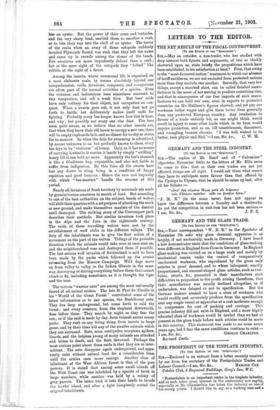BATTLES OF BIRDS AND BEASTS.
MR. F. T. SULLEN in a striking article in the County Gentleman of November 14th describes a battle between seagulls and rooks. The rooks resented the intru- sion of a single seagull among their sable company, after a storm had blown it inland. Next day a large flock of gulls, which had drifted before the storm like the single stranger the day before, apparently learnt in some way to share its feelings as to this inhospitable welcome, and attack- ing the rooks, drove them from the neighbourhood where they had been wont to feed by day, and to gather by night in a favourite roosting-place.
Probably in days long before the parodist of Homer wrote the "Battle of the Frogs and Mice" contests between different communities of animals occasionally took place. But in spite of the monkish legends attributing fixed antipathies to different species of animals, these conflicts have always been rare, though for that reason they have generally been recorded when seen. The British birds whose battles have been most frequently recorded in England are the herons and the rooks. In the annals of the Earlham heronry in Norfolk
it appears that the birds, being disturbed in an old haunt, migrated to a rookery at Keswick, near to Norwich, in 1810. Here the rooks kept up a war upon them, and though the herons maintained their conquest for a long series of years, their departure was attributed to the persecution of their black neighbours. After various wanderings, they moved
into a Scotch-fir grove at Earlham, where they were again attacked by the rooks and driven away to a neighbouring
plantation. But the classical battle between the rooks and herons was one which took place at Dallam Tower in West- morland, and was the subject of a note in Thomas Bewick's "History of British Birds." There were two groves,—one inhabited by rooks, the other by herons. In 1775 the best trees in the latter were cut down in the nesting season, when the herons tried to settle in the rookery, one of the largest in the county. The rooks made an obstinate resistance, in the course of which many of them were killed, as well as some herons. But the latter prevailed and hatched off their young. Next year a similar contest took place with the like results, after which the two tribes lived side by side in peace.
The incidents of animal life in the deep seas are necessarily almost unknown. Nor are the smaller fishes common in the deep ocean. It is the home mainly of the very large and the minor or microscopic forms of life,--of roving whales and lesser cetacea, or of the entomostraca and their immature progeny. But there is every reason to believe that even in the main oceans life is a scene of incessant warfare, waged by all degrees, from the swimming atoms to the leviathans of the deep. The only instances of what appear to be in a degree organised and combined raids of one species on another are the attacks made upon whales by the thresher sharks, several of these animals going together to attack either one or sometimes more whales. The extermination of all the- Atlantic "right whales" which once frequented the coasts of Biscay, and the great scarcity of those which survive along the ice-fringe of the North, have immensely reduced the chance of verifying by further observation the descriptions given of these battles by eye-witnesses. It has been sug- gested that the aggressors were not threshers or fox sharks, but grampuses. On the other hand, there is a persistent tradition that the sawfish also attacks the whale. It is quite possible that both the first two species do so, and even the third ; but the common feature in all the accounts is that there is a combination by the smaller and better-armed oetacea or sharks to attack the giant.
Though the great moving shoals of food-fish, such as herrings or mackerel, are followed by hosts of fierce enemies, which feed upon them, their aggressions usually resemble the attacks of marauders following a caravan, rather than organised raids. But occasionally the attackers appear so suddenly, and in such numbers together, as to give the appearance of a regularly planned invasion. Such was the entry of a small horde of seals into the Wash two years ago, and a similar seal invasion of the mouth of the Somme a year later. In the autumn of the present year an army of porpoises attacked the shoal-fish off the port of Brest, and did such mischief that a counter-raid with guns and harpoons was organised by the fishermen against them. Doubtless, if we could only see what is taking place daily beneath the surface of the shallow coastal seas, the raids and counter- raids of the carnivorous fishes and crustaceans would give material for many fresh chapters like those in which Jules Verne related the adventures of his glorified "submarine."
A glimpse at a marine tragedy on a vast scale was enjoyed by the people of Plymouth some few years ago. The English Channel was invaded, mainly on the French shore, but also on the English coast as far east as Tor Point, by vast numbers of extremely voracious cuttlefish, which usually keep to warmer waters, but were probably tempted by a series of un- usually hot summers to extend their range. Like most creatures which suddenly find themselves in a new environment, they throve amazingly, and the second summer saw them in even greater swarms than did the first. They settled in millions in the rocks round the Channel Islands and off the coast of Brittany, destroying mainly the slow-moving creatures, lobsters, crabs, and the like, and devouring the fixed molluscs, such as oysters and mussels, without mercy. It would seem almost impossible to believe, from a casual view of these soft octopods, that they could injure a hard-shelled crab, much
less an oyster. But the power of their arms and tentacles, and the very sharp beak, enabled them to smother a crab, or to bite their way into the shell of an oyster. The terror of the crabs when an army of these octopods suddenly invaded Plymouth Sound was such that they left the water and came up in crowds among the stones of the beach. Few creatures are more impudently defiant than a crab ; but at the mere sight of the octopods they " bolted " like rabbits at the sight of a ferret.
Among the insects, where communal life is organised on a most elaborate scale, by means absolutely beyond our comprehension, raids, invasions, conquests, and occupations are often part of the normal activities of a species. Even the virtuous and industrious bees sometimes succumb to this temptation, and rob a weak hive. But bees' raids have only robbery for their object, not occupation or con- quest. When a swarm goes out, it not only does not go forth to battle, but deliberately makes itself unfit for fighting. Probably every bee-keeper knows how this is done, and why ; but possibly not every one else does. The bees seem quite aware, as we believe that no other insects are, that when they leave their old house to occupy a new one, there will be empty cupboards in it, and no dinner for to-day or stores for to-morrow. So when the date for swarming is advertised, by means unknown to us but perfectly known to them, every bee lays in its " viaticum " of honey. Only, as it has no means of carrying it outside, it carries it inside by simply " swilling " honey till it can hold no more. Apparently the bee's stomach is like a Gladstone bag, expansible, and also not liable to suffer from indigestion. By this time all the swarm have lost any desire to sting, being in a condition of happy repletion and good humour. Hence the ease and impunity with which " bee-masters " handle the swarms at this period.
Nearly all invasions of fresh territory by mammals are made by gmminivorous creatures in search of food. But according to one of the best authorities on the subject, bands of wolves will shift their quarters with a set purpose of attacking the stock or new ground, and make themselves masters of the district until destroyed. The striking story of the Cnrrumpaw pack describes their methods. But similar invasions took place in the Alps and the Jura in the eighteenth century.
The raids of these travelling wolves were met by the establishment of wolf clubs in the different valleys. The duty of the inhabitants was to give the first notice of a movement on the part of the wolves. Tidings of the probable direction which the animals would take were at once sent on, and the neighbourhood rose and destroyed them if possible.
The last serious wolf invasion of Switzerland is said to have been made by the packs which followed up the armies retreating from the Moscow Campaign. Wild dogs move on from valley to valley in the Indian Ghauts in the same way, destroying or driving everything before them that cannot climb or fly, including sometimes, as it is thought, the tiger and the bear.
The various "warrior ants" are among the most universally feared of all animal raiders. The late M. Paul du Chaffin in his "World of the Great Forest" contributed some of the latest information as to one species, the Bashikouay ants. They live deep underground, but come forth to raid the forest; and every creature, from the elephant downwards, flees before them. They march by night, as they fear the sun; or if the raid is made by day, form tunnels across sunny paths. They rush on any living thing, from insects to large game, and by their bites kill any of the smaller animals which they can surround. Rats, mice, centipedes, scorpions, spiders, lizards, and the helpless young of many animals are attacked and bitten to death, and the flesh devoured. Perhaps the most curious point about these raids is that they are so inter- mittent. The ants disappear again underground, and appa- rently exist without animal food for a considerable time, until the armies once more emerge. Another class of inhabitant of the West African forest is that of the grey parrots. It is stated that among some small islands off the West Coast one was inhabited by a species of hawk in large numbers, while another was held by a colony of grey parrots. The latter took it into their heads to invade the hawks' island, and after a fight completely ousted the original inhabitants.



























































 Previous page
Previous page